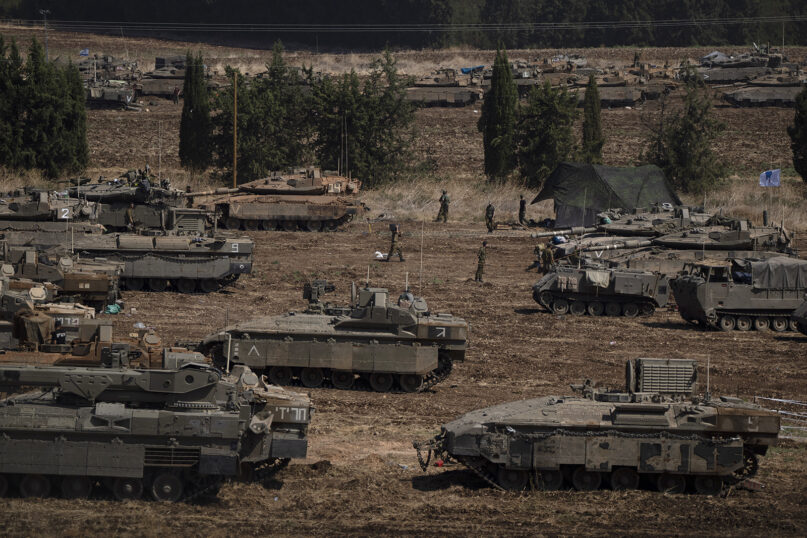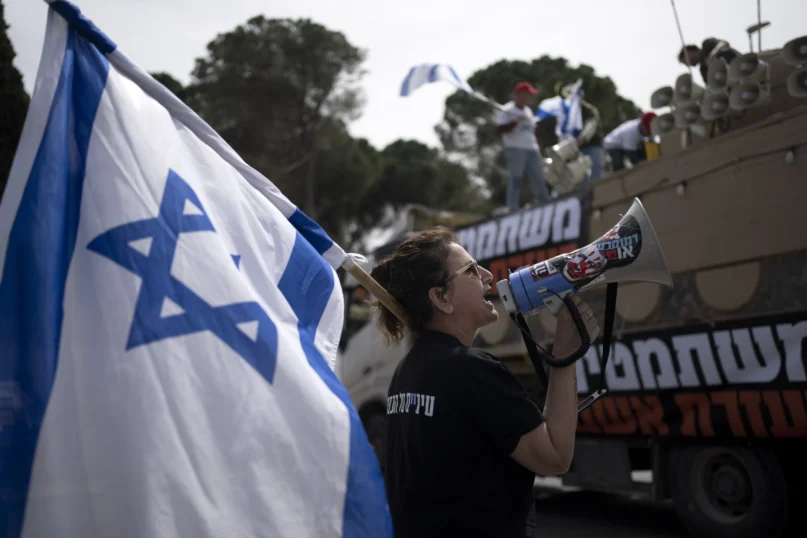JERUSALEM (RNS) – When Shari Fisch learned there would be a march and demonstration outside Israel’s parliament building on April 2 to demand universal military conscription, she said she felt compelled to attend.
“The IDF doesn’t have enough combat soldiers,” said Fisch, who lives in Jerusalem. “My son’s combat unit has called him three times for miluim,” she said, referring to Israel’s military reserve duty.
The manpower shortage has also affected her workplace, where a quarter of its employees have been called up for reserve duty for months at a time during the year-and-a-half-long war in Gaza, she said.
“My co-worker was in miluim for seven months, from Oct. 7 until after Passover, then again over the summer, then again after his second son was born,” Fisch said. “Other staff had siblings and children in miluim for months. How is this tenable? We need the miluim burden of service shared over a greater pool of people.”
While the demonstration, which was organized by Israel Defense Forces reservists and bereaved families of IDF soldiers killed during military service, demanded universal military conscription, it was aimed mostly at Haredi men, also known as the ultra-Orthodox. For decades, Haredi young men were exempt from military service, provided they studied Torah full time in a yeshiva. Then, Israel’s High Court canceled this exemption.

Israeli soldiers work on tanks and armored personnel carriers in northern Israel, Sept. 30, 2024. (AP Photo/Leo Correa)
Last June, the High Court unanimously ruled that the military must begin drafting ultra-Orthodox men for compulsory service, ending exemptions for the fast-growing Haredi community, which now comprises 12% of the population. But Haredi lawmakers, who sit in Prime Minister Benjamin Netanyahu’s coalition government, have threatened to topple the government if the Knesset fails to reinstate the draft exemption, despite its unpopularity.
The April 2 protest brought together a diverse array of Israelis — from modern Orthodox to secular, right wing to left wing – who want Haredi young men to defend the country. About 5,000 people marched through Jerusalem to the Knesset and listened to speakers’ calls to conscript the 66,000 Haredi young men eligible to be drafted. Between July 2024 and March 2025, just 2% of 10,000 young Haredim who received a draft notice enlisted, according to the IDF.
A week earlier, on March 27, several Haredi rabbis, heads of yeshivas and their students gathered for what they described as a “prayer rally” against the conscription of Haredi men. According to a report in Ynet News, the demonstrators came from the most “extreme” religious factions.
Rabbi Moshe Tzadka, head of Yeshivat Porat Yosef in Jerusalem, told the crowd of several thousand: “A law should be passed that everyone goes to yeshiva, not to the army. We are people of faith, and we believe in the coming of the Messiah’s birth pangs — and this is it.” Saying that religious Jews are “waiting for the army of King David, not theirs,” the rabbi predicted, “If a law mandated that everyone learn Torah, redemption would already be here.”
In contrast, the motivation to serve is high among Jews who identify with the National Religious Party, which represents settlers and religious Zionists. Thousands of draft-age men from this sector serve in special “hesder” units that combine combat service with Torah study. Dozens of these soldiers have been killed or injured in battle.

Members of Brothers and Sisters in Arms and Bonot Alternativa (Women Building an Alternative) protest Israel’s exemptions for ultra-Orthodox Jews from mandatory military service, near the prime minister’s office in Jerusalem, March 26, 2024. (AP Photo/Maya Alleruzzo)
Rabbi David Stav, co-founder of the Tzohar Rabbinical Organization — an organization that aims to unite religious and secular Jews in Israel — and a member of the National Religious camp, rejected Haredi leaders’ claims that serving in the IDF is a threat to Jewish observance and the idea that prayer is equivalent to IDF service.
“Sharing societal responsibility is both a Jewish and human moral concept,” Stav said in a statement ahead of the march. “Serving in Israel’s army sits at the very core of our civic responsibility to ensure the continued defense and very existence of our people and nation.”
Stav said it is “disgraceful” to suggest “that avoiding army service can be justified by religion or that it should be the job of only certain sectors of the population to accept this awesome responsibility.” Dodging military service “is nothing short of a desecration of God’s name and must be rectified,” he added.
Speaking at the demonstration, Laly Derai, whose son Saadia was killed in combat last June, urged Haredi men to enlist in large numbers. Few Haredim were in attendance, but the speech by Derai, a resident of the Eli settlement in the West Bank, was picked up by the national media.
“Haredim, my brothers, be our brothers according to the word of God, not according to the words of the newspaper Hamodia,” Derai said, referring to an influential Haredi publication that advocates against drafting ultra-Orthodox Jews. “Sanctify God’s name,” she said, because serving in the army “is what God requires from us. The disagreement between us is not a matter of Torah, because the Torah states clearly what we need to do. It is an ideological and political disagreement.”
Standing in the crowd, Ruthi Soudack, a Jerusalem resident, said she came to the rally to support miluim families.
“Since the war started, there are reservists being called up, over and over,” she said. “Their families are falling apart, their businesses are falling apart. They’re tired.”
Even before the war, Soudack said, she “felt it was unjust that so few Haredim served.”
“It’s absurd that such a large segment of the population was exempt, and even more so now, with the disproportionate amount of funding the community is getting from the population,” she said, referring to the generous government funding that Haredi communities receive in Israel for yeshivas and other religious institutions.
While acknowledging the contribution of Haredi men who are serving, the fact that so few enlist “compromises the safety of the nation,” Soudack added.
